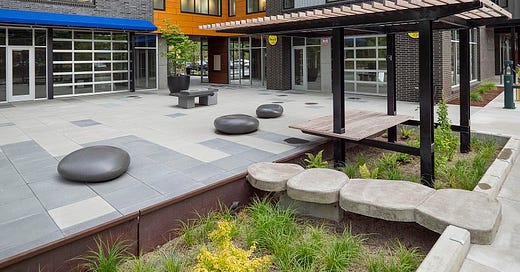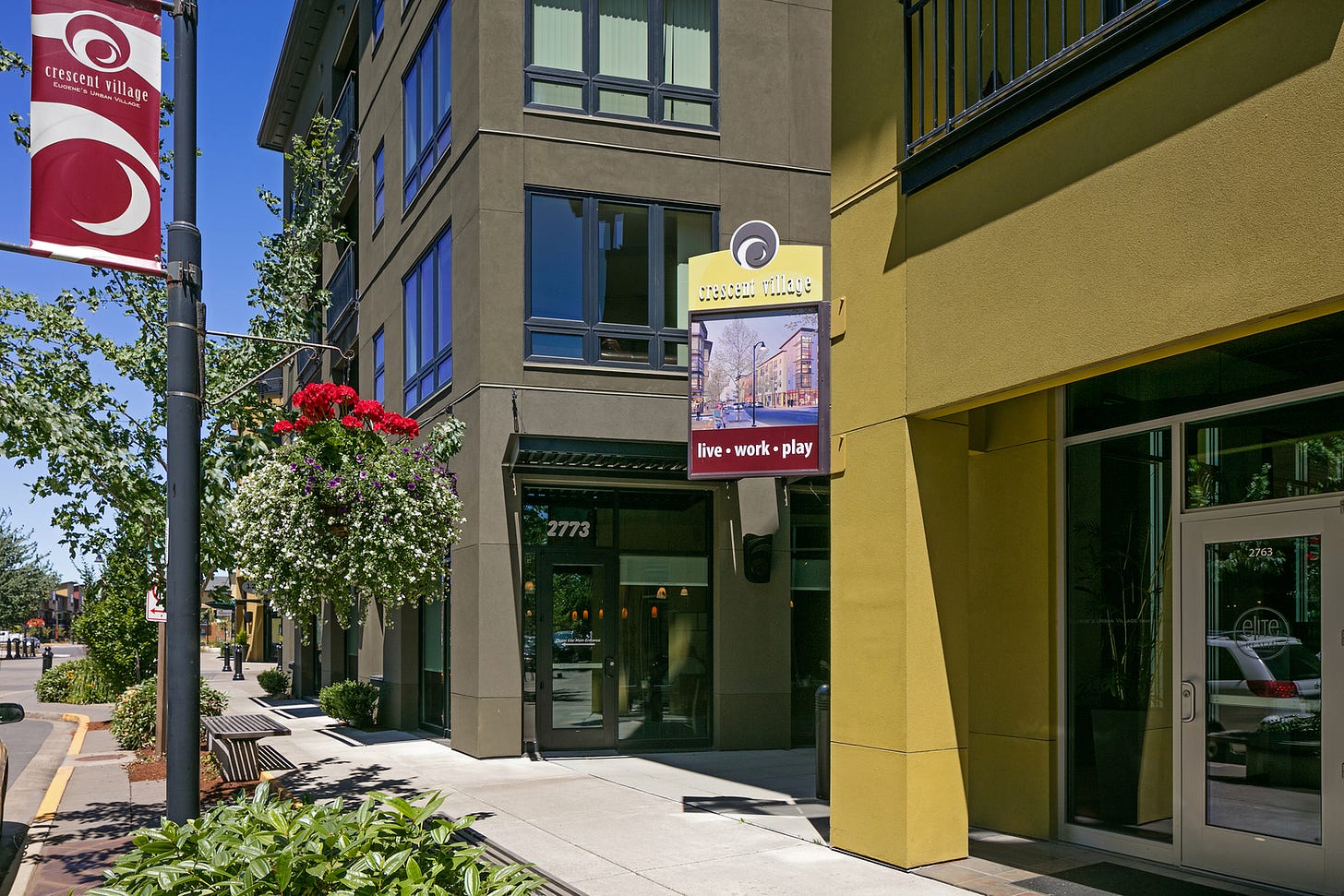Eugene can boast a few notable successes in building livable communities. Controversy remains around implementing housing density policies, and we have a long way to go to meet our housing production goals. However, some recent projects and policies are beginning to fill in the gaps in housing supply. In Amazon Corner, Crescent Village, and the new pre-approved ADU designs, Eugene continues to make it easier for young people to find homes and seniors to stay in their neighborhoods.
Amazon Corner. In recent years, heated debates surrounded development of Amazon Corner. Erected on the site of a defunct church at 32nd and Hilyard, it is a five-story luxury apartment building with commercial space on the first floor. Close neighbors objected to the height, while those farther back worried about parking and traffic. As it turned out, neither of these problems materialized. Indeed, street parking is still abundant, suggesting that the expensive underground garage required for the permit was probably unnecessary. The worries about shading the yards of houses on the West side of Alder were alleviated with a good site plan. Amazon Corner now provides places for both young professionals and seniors to live in our neighborhood. Provisions South and Xicha Brewing offer a substantial upgrade to our street life without intruding on the quiet neighborhood nearby. I rarely walk by without seeing people chatting happily in the plaza.
Crescent Village. Parts of Crescent Village in North Eugene achieved the same active street life with the residential over commercial model. The restaurants, gyms, and stores not only provide convenient services for residents, but they draw customers from around the city. Eating lunch at B2 the other day, my wife and I were happy to see so many people out and about, enjoying each other’s company across a range of ages. We enjoy our single family detached house now, but eventually the time will come when a whole house is more than we want to manage. That part of Crescent Village would be a nice place to live.
Not every Crescent neighborhood development works as well. As we left, we saw gated communities of mini-mansions and apartments without commercial spaces. Yes, they looked like nice buildings, but they lacked the vibrancy and convenient access to amenities that are important to community life.
Accessory Dwelling Units. Like most of the folks on our street, we love our house in a quiet part of town with easy access to parks, bus lines, and basic shopping needs. But it is designed for a young family with time and energy for maintaining it. One option for us is to build an accessory dwelling unit (AKA a mother-in-law apartment or a granny flat) in the back yard. Eugene has allowed these for a few years and recently came up with additional pre-approved plans from several local architects. Choosing one of these plans saves time and money. Perhaps one of our children will move home to raise our grandchildren. Living in the granny flat would allow us all to enjoy the property, while also having our own space. I’d like to commend Eugene’s city planners for this one. As I saw in the legislature, it’s one thing to enable something legally, but quite another to make it come into being.
Like all infrastructure problems, our housing shortage won’t be solved overnight. However, it’s good to see these first positive steps to diversify housing in our own community. Our housing needs change throughout our lifetimes. We should have ways to stay in our neighborhoods as we grow.
Other News
Crazy or Crazy Like a Fox? The current arrangement in the US House requires the Speaker to cater to the far right of his party. That fringe has strongly unpopular views on both culture war issues and government spending. As part of the debt limit deal, the House insisted that, should Congress fail to pass all of its spending bills by the end of the calendar year, automatic cuts of 1% would cut across defense, non-defense discretionary, and veterans spending. Sold as a way to ensure everyone worked together to protect the spending they support, that agreement has moved from a distant fallback position to an increasing likelihood. The far right has attached a number of unpopular policy riders to budget legislation in the last month with straight party-line votes. By contrast, the Senate has passed bipartisan bills. In the normal course of events these bills would be reconciled in a conference committee, stripped of the more objectionable language, and passed by large margins. However, this runs up against two realities - 1) it takes time and goodwill to reconcile bills; and 2) the far right does not want to reconcile these bills. They would be perfectly happy to have the 1% cuts take effect. I expect that we will have a showdown at the end of the year. While I object to their way of bringing it about, it is a long overdue conversation. Fitch’s rating service just downgraded US debt for our failure to confront deficit spending. We need to face our budget realities. That seems like a forlorn hope as we approach an election year.
Kudos! I’d like to congratulate Carolyn Stein on her recent appointment as Executive Director at Food for Lane County. She did a great job at BRING. We’re lucky to have her working to feed our neighbors.








I keep hearing about housing shortages in Oregon. There is definitely a shortage in housing people can afford, but a shortage in general? How can that be when they have built so many large apartment buildings in the last few years? And the population numbers have not increased that much. Are those new buildings full? Who is living in them?